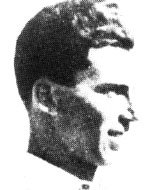Friedlander, Baruch (Wilmush, Willy)
Son of Wilma and Rafael. He was born on May 14, 1918, in Trenczyń, Slovakia, with his father, who was a teacher at the Gymnasium, educated the boy in a Jewish-national spirit, and his mother, the second wife of the father. Baruch graduated from the elementary school and at the age of 14, he joined the Hanoar Hazioni Movement and a year later participated in the Maccabi Hatzair summer camp in Ardelez with his father. He founded a youth battalion in Negerje, and was also one of the founders of “Maccabi Hatzair” in Budapest, and after graduating from high school, But in Hungary he was not allowed to be admitted to work in Czechoslovakia, but in Hungary the government forbade the organization of Zionist pioneering training, then enrolled in medical studies at the University of Prague, and after a year he enrolled in philosophy studies after the German invasion of the Sudetenland in Czechoslovakia. He moved to Paris and continued his studies there, where he worked in physical work and wrote articles for Hungarian newspapers, and in early 1939 he joined a group of illegal immigrants and immigrated to Eretz Israel. In Israel, the Zionist fervor and the full faith in his path continued. He did not shy away from physical work. He worked in the port and in the canals, in the fields and in the building. After the outbreak of World War II he immediately volunteered for the British Army. He wrote from his military unit to his comrades: “The direct danger that threatens our country has not given me peace and I could not accept the fact that I will sit idly by and be passive to all that is happening.” During his military service, he was a member of the vanguard who participated in the conquest of Syria by the British. On the day after his return to his kibbutz on 12 Tishrei, October 3, 1941, Arab shepherds with their herds came up on Jewish fields near Ir Ganim in the Haifa Bay. A unit of guards from Ramat Yohanan and friends from Kfar Maccabee, including Baruch, were called for help. The shepherds did not respond to the demand to leave. A melee broke out, during which the shepherds shot and killed Baruch. He was laid to rest in the Kfar Maccabee cemetery. Members of his kibbutz published a pamphlet in his memory and things in his memory were also published in the newspapers Davar and Bamahaneh.
